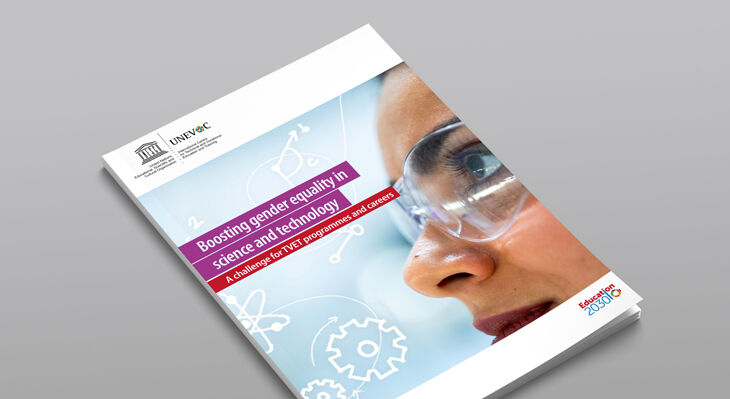BIBB contributed to UNESCO-UNEVOC study on ‚Boosting gender equality in science and technology
09.12.2020
A study on ‚Boosting gender equality in science and technology. A challenge for TVET programmes and careers‘ was published by UNESCO-UNEVOC with the support of BIBB.

Science, technology, engineering and mathematics (STEM)-related technical and vocational education and training (TVET) has a potentially significant role to play in providing the skills and competencies required to support innovation, productivity and international competitiveness as well as areas of social development including health and education. It is thus an important driver for achieving a range of the United Nations’ Sustainable Development Goals (SDGs) and contributing to inclusive and sustainable societies. STEM skills and knowledge can be required for both ‘traditional’ and ‘emerging’ occupations; STEM-related careers are often referred to as the ‘jobs of the future’, driving innovation, inclusive growth and sustainable development.
Even as STEM subjects and skills are becoming more essential in today’s world, gender disparities are prevalent in these fields. In recent years, much has been done to help inspire girls and women to study and work in technical fields. Yet long-standing biases and gender stereotypes are steering girls and women away from STEM-related fields, which means that a large pool of potential skills that could contribute to economic development remains untapped. It can put major constraints on the individual lives of women and contribute to transmitting gender inequalities across generations.
Recognizing the gap in TVET-specific data and literature, UNESCO-UNEVOC conducted the study on Boosting gender equality in science and technology. A challenge for TVET programmes and careers throughout 2019 and 2020 with support of UNEVOC-Centres from Australia, Chile, Costa Rica, Germany, Ghana, Jamaica, Lebanon, the Netherlands, the Philippines ans South Africa.
The BIBB - division Electrical, IT- and Scientific Occupations has been conducting a research project regarding the topic “Women opt for STEM” since 2019. The project is investigating which personal, social or contextual factors lead to a positive choice of occupation in STEM related areas by women and which general conditions promote women´s career in male-dominated areas.
Because of the thematic overlap with the project, BIBB employees supported the preparation of the UNESCO-UNEVOC Study by sharing findings from the project as well as data and facts regarding the situation of Women in STEM-related occupations with UNEVOC.